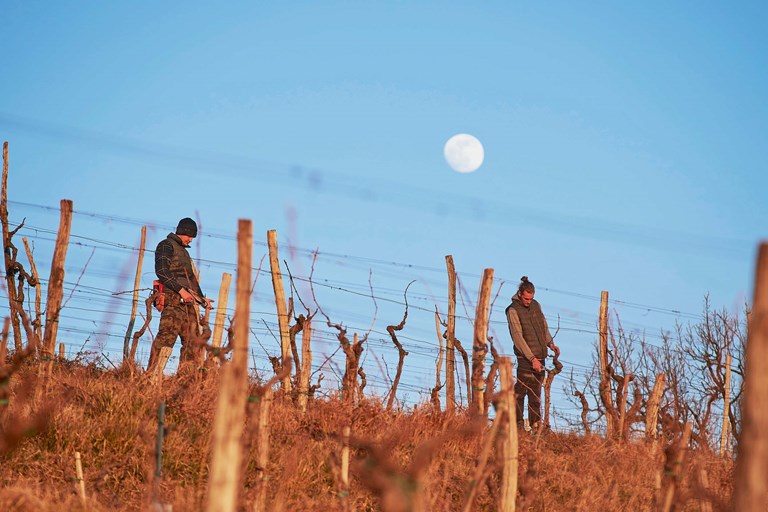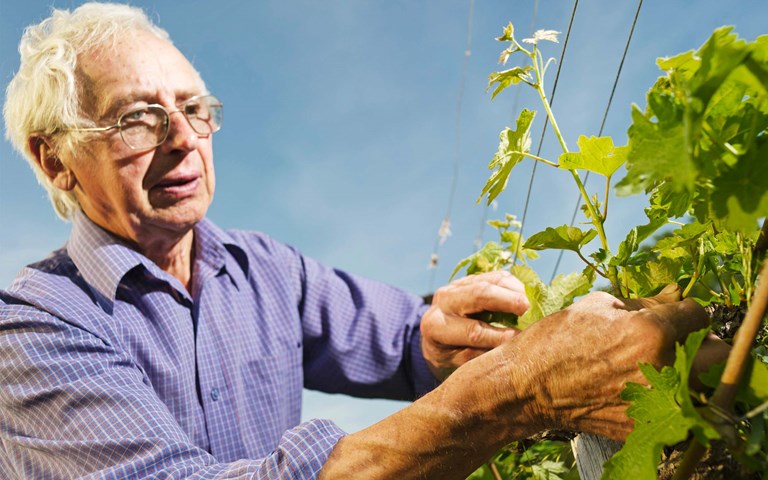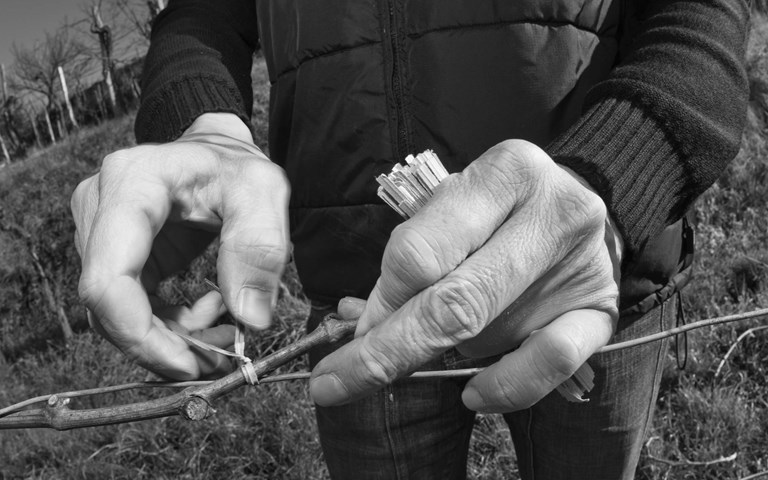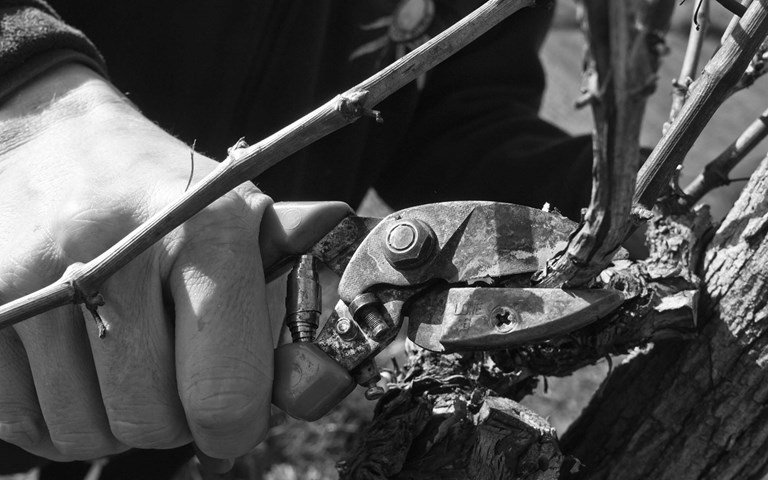
Grape harvest on the border
The twentieth century has moved several times the border in the lands of the Collio,when the imperial eagle of the Habsburgs was lowered, the green slopes found themselves disputed between Italy and Yugoslavia. Then Yugoslavia broke up and, since the 1990s, there has been an Italian Collio in Friuli and a Slovenian Collio: Goriska Brda.

For lovers of white wines, all this translates into a wine with two names: Ribolla and Rebula. Two ways of calling the same vine, grown in the hills on either side of the border. And on the Slovenian side, just under a kilometre from Italy, is the land of Edi Simčič. There are thirteen and a half hectares, which, since the late 1980s, have led to the creation of labels made of passion and love for their territory. Edi is now 88 years old and his son Aleks, who contributed to the birth and growth of the family business, has taken over the helm for some time. It is with him, that we talk about how it all began with a choice to change one’s life, or rather to do better what one loves to do.
Mr Simčič, when did you start bottling the first bottles with your labels?
“It was 1989, we started with a production of 4 thousand and now we are at about 60 thousand.”
You were a young man, your father was already over 40, why did you choose to embark on this adventure?
“He had worked in an agricultural cooperative since his youth and didn’t want to retire. He wanted to do what he liked best, to put his experience to good use. So he took his grandmother’s family land and together we started to cultivate vines.”
So he went back into the game to prove that better wines could be made?
“Yes, that’s what he did and he succeeded in communicating this love for the vineyard, the wine and the terroir to me as well. I hope I have passed it on to Jure and Jacob, my two sons who help me run the business.”
What did your father pass on to you?
“A credo/”A belief: to do well whatever you do. Then he said that nature speaks to those who can listen to it. It is only by listening to it that you can make predictions, understand how best to develop the vineyard, make the necessary changes.”
Speaking of territory, what is the difference between Collio Friulano and Goriška Brda?
“Let’s say that we feel more the influence of thee are exotic, mineral, more saline, full-bodied and fresh at the same time. In the case of the whites, they have an ageing potential of up to 10-15 years.”
And what about winemaking?
“We do everything in barrels, we have completely removed the steel.”
How did the 2021 vintage go?
“We were lucky. There were no hailstorms or weather events that caused any damage. Very good grapes. We start harvesting the white grapes just before mid-September and continue with the other grapes for a period of 4-6 weeks.”
You describe yourself as stubborn, persistent, hard-working and openminded. Do you need technique or imagination to make wine?
“I plan where we will be in ten years, how we will get there, who will drink our wines. The organisation and the technical aspect are fundamental. But wine is passion, a love that warms the soul and sanctifies work. That’s why it’s only right that emotions should have a place. Because the right wine is the one that wins me over with the first glass. It’s love at first sight.”

Is wine made in the vineyard or in the barrel?
“The character of a vintage is shaped during the period of flowering and ripening; and it is never influenced by exactly the same relationships between the heat of the sun, the rain or the storm. With our care and work, we are only supporting the vine in giving the best that was intended for the grapes. After that, our wines simply rest in their cellar. We let them become according to the quality of the vintage. This is the foundation of our style of wine.”
Yours is a wine that is very much inspired by natural rhythms.
“Yes. Nature teaches us to think naturally in our daily work. Morning dew says something about the brevity of life and roots can teach you a lot about persistence. The sun encourages a wealth of thoughts about abundance; frozen grains remind us that pause and reflection also have their purpose. Our approach to the work takes inspiration from nature and this obviously influences the production as well.”
Your signature is the Rebula, but you also offer other blends and you don’t just have whites. Tell us about your labels.
“We have Rebula in purity, but we also offer it in a blend in which it meets Chardonnay and Sauvignon; it is Triton Lex, a structured, aromatic and balanced wine. We also have labels of Malvasia, Pinot Blanc and Pinot Gris. Our red is the Duet with Merlot, Cabernet Sauvignon and Cabernet Franc. We are also working on producing wine labels made from grapes from individual vineyards. Such as Fojana Rebula, Fojana Sauvignon, Kozana Chardonnay and Kozana Merlot.”
Recommended pairings?
“With Rebula, cold dishes or raw fish, anything that enhances its salinity is perfect. Triton Lex, on the other hand, is a more structured wine that can age and can also be drunk throughout a meal.”
Objectives for the future?
“We are increasing the area under cultivation to 15 hectares and we want to be able to continue transmitting our passion for wine and the land, making better and better wines in harmony with nature.”

A brief history of Ribolla gialla or Rebula
The first written documentation of the existence of this grape can be found in a notarial contract of 1289 concerning wine-growing land in the Friuli region. ‘Indulgence’ towards Ribolla wines was mentioned in the 14th century as one of the sins of gluttony by the Italian poet Giovanni Boccaccio, and when the Duke of Austria, Leopold III of Austria, established his kingdom over Trieste, the city had to provide him with 100 urns of the best Ribolla wine in the region every year. In 1402, the reputation of wine made from the grape was such that the city of Udine was forced to pass a law prohibiting the adulteration of any wine made from Ribolla. Then the phylloxera epidemic of the 19th century destroyed many Ribolla plantations and many owners then chose to replant their land with imported French wine grapes such as Merlot and Sauvignon Blanc. In recent years, however, there has been a return to the indigenous grape variety, with excellent oenological results.
Aleks Simčič
Year of birth: 1968
Profession: winegrower and producer of wines
Aleks Simčič is the son of an artist. At the end of the 1980s he started working with his father Edi in the new family business to produce wines on the estate in the Slovenian Collio on the border with Italy. Over the years he learned the art of winemaking from his father and now runs the business with the help of his two sons. He describes himself as stubborn, persistent, hard-working and open-minded.

Playlist


